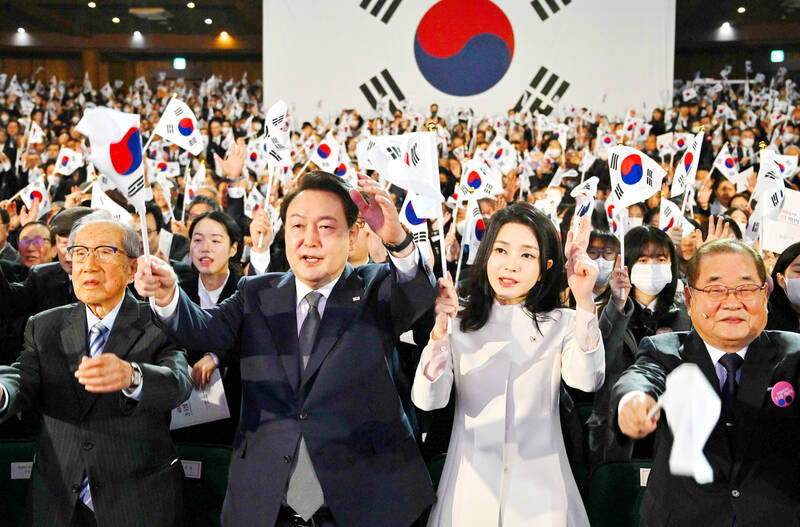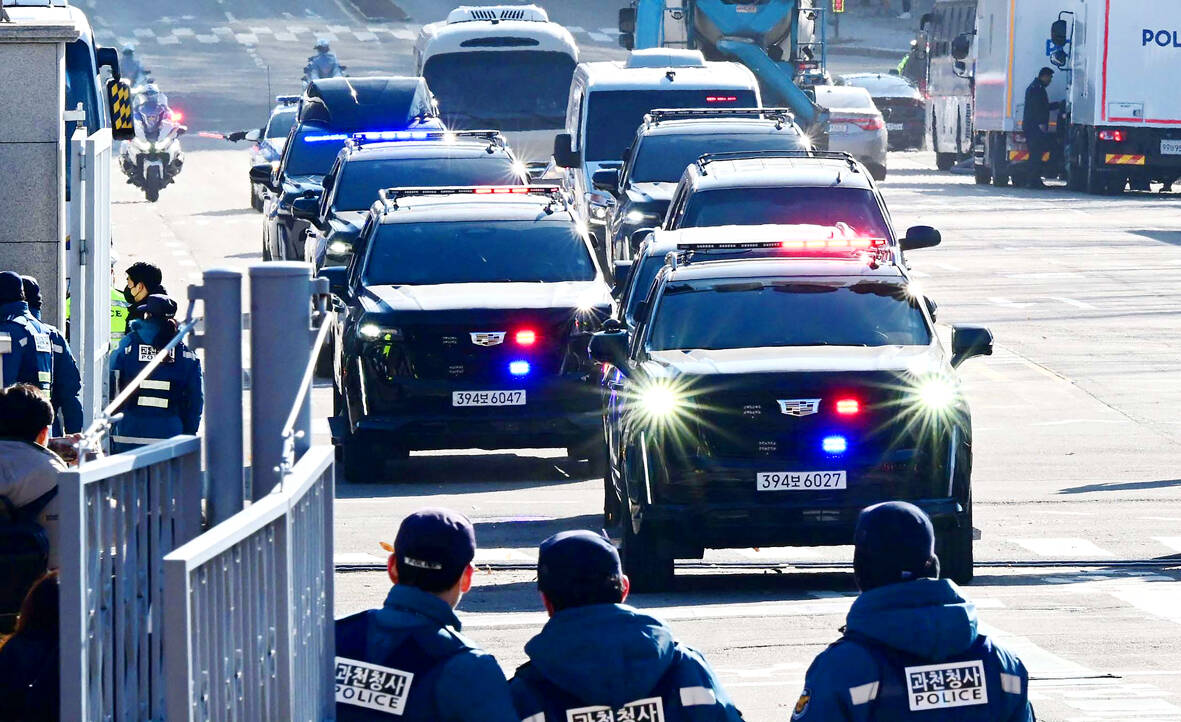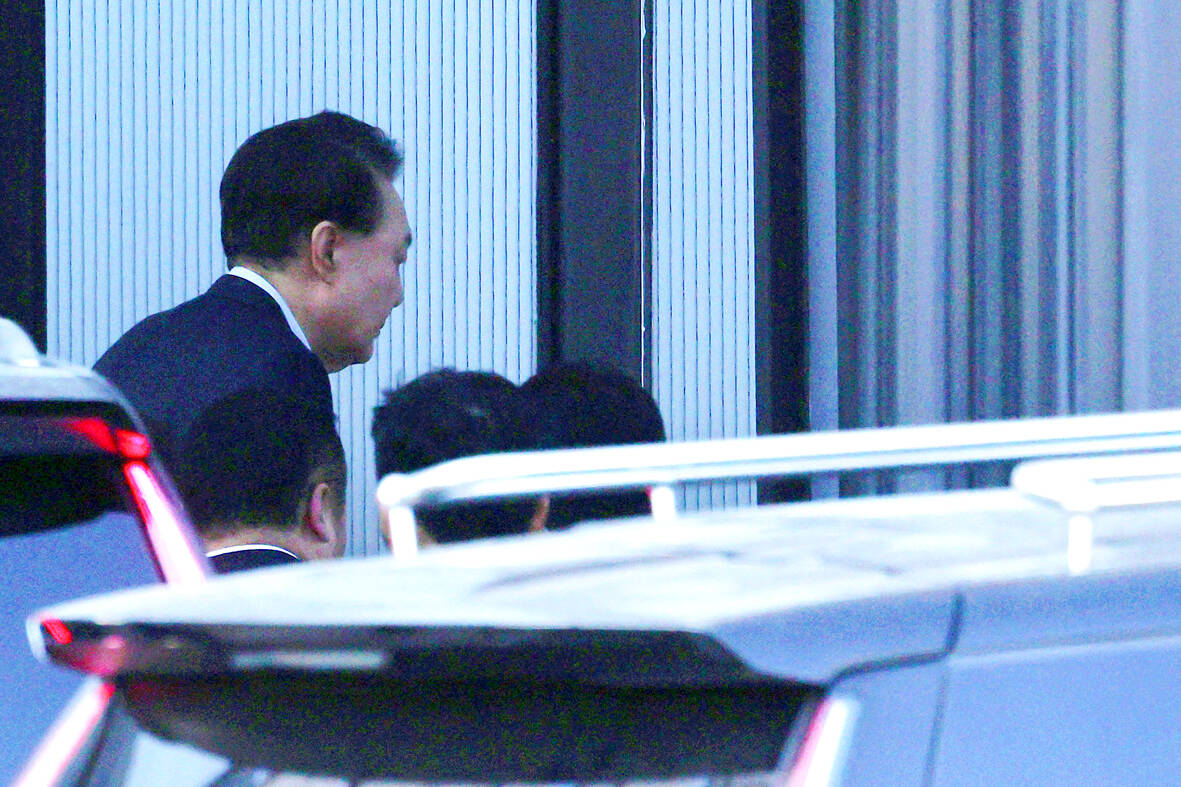South Korea’s Yoon Suk-yeol rose from star prosecutor to the presidency in just a few years, but after a series of scandals and a bungled martial law decree, he’s become the country’s first-ever sitting president to be arrested. The lurch back to South Korea’s dark days of military rule on Dec. 3 only lasted a few hours, and after a night of protests and high drama Yoon was forced into a U-turn by lawmakers.
He has since been impeached — pending a court trial that began this week — and resisted arrest until yesterday, when he backed down to investigators after a tense, weeks-long political standoff.
He said the investigators did not have the authority to arrest him and that he had only complied to avert “bloodshed” — but his name is now etched in history. As well as the first sitting South Korean president to be arrested, he is the third to be impeached by parliamentary vote, and, if upheld by the Constitutional Court, would be the second to be removed from office.

Photo: AFP
BORN IN DICTATORSHIP
Born in Seoul in 1960 months before a military coup, Yoon studied law and went on to become a public prosecutor and anti-corruption crusader.

Photo: AFP
He played an instrumental role in Park Geun-hye, South Korea’s first female president, being impeached in 2016 and later convicted for abuse of power and imprisoned.
As the country’s top prosecutor in 2019, he also indicted a senior aide of Park’s successor, Moon Jae-in, in a fraud and bribery case.
The conservative People Power Party (PPP), in opposition at the time, liked what they saw and convinced Yoon to become their presidential candidate.

Photo: AFP
He won in March 2022, beating Lee Jae-myung of the Democratic Party, but by the narrowest margin in South Korean history.
HALLOWEEN TO HANDBAG
Yoon was never much loved by the public, especially by women — he vowed on the campaign trail to abolish the ministry of gender equality — and scandals have come thick and fast.
This included his administration’s handling of a 2022 crowd crush during Halloween festivities that killed more than 150 people.
Voters have also blamed Yoon’s administration for food inflation, a lagging economy and increasing constraints on freedom of speech.
He was accused of abusing presidential vetoes, notably to strike down a bill paving the way for a special investigation into alleged stock manipulation by his wife, Kim Keon-hee.
Yoon suffered further reputational damage in 2023 when his wife was secretly filmed accepting a designer handbag worth US$2,000 as a gift. Yoon insisted it would have been rude to refuse.
His mother-in-law, Choi Eun-soon, was sentenced to one year in prison for forging financial documents in a real estate deal. She was released in May last year.
Yoon himself was the subject of a petition calling for his impeachment last year, which proved so popular the parliamentary Web site hosting it experienced delays and crashes.
‘YOU CAN SING’
As president, Yoon has maintained a tough stance against nuclear-armed North Korea and bolstered ties with Seoul’s traditional ally, the US.
In 2023, he sang Don McLean’s American Pie at the White House, prompting US President Joe Biden to respond: “I had no damn idea you could sing.”
But his efforts to restore ties with South Korea’s former colonial ruler, Japan, did not sit well with many at home.
Yoon has been a lame duck president since the opposition Democratic Party won a majority in parliamentary elections in April last year. They recently slashed Yoon’s budget.
In his televised address declaring martial law, Yoon railed against “anti-state elements plundering people’s freedom and happiness,” and his office has subsequently cast his imposition of martial law as a bid to break through legislative gridlock.
But to use his political difficulties as justification for imposing martial law for the first time in South Korea since the 1980s was absurd, an analyst said.
“Yoon invoked Article 77 of the South Korean constitution, which allows for proclaiming martial law but is reserved for ‘time of war, armed conflict or similar national emergency,’ none of which appears evident,” said Bruce Klingner, a senior research fellow at the Heritage Foundation.
“Yoon’s action is a damning reversal to decades of South Korean efforts to put its authoritarian past behind it,” he said.

Most heroes are remembered for the battles they fought. Taiwan’s Black Bat Squadron is remembered for flying into Chinese airspace 838 times between 1953 and 1967, and for the 148 men whose sacrifice bought the intelligence that kept Taiwan secure. Two-thirds of the squadron died carrying out missions most people wouldn’t learn about for another 40 years. The squadron lost 15 aircraft and 148 crew members over those 14 years, making it the deadliest unit in Taiwan’s military history by casualty rate. They flew at night, often at low altitudes, straight into some of the most heavily defended airspace in Asia.

Many people in Taiwan first learned about universal basic income (UBI) — the idea that the government should provide regular, no-strings-attached payments to each citizen — in 2019. While seeking the Democratic nomination for the 2020 US presidential election, Andrew Yang, a politician of Taiwanese descent, said that, if elected, he’d institute a UBI of US$1,000 per month to “get the economic boot off of people’s throats, allowing them to lift their heads up, breathe, and get excited for the future.” His campaign petered out, but the concept of UBI hasn’t gone away. Throughout the industrialized world, there are fears that

Taiwan’s democracy is at risk. Be very alarmed. This is not a drill. The current constitutional crisis progressed slowly, then suddenly. Political tensions, partisan hostility and emotions are all running high right when cool heads and calm negotiation are most needed. Oxford defines brinkmanship as: “The art or practice of pursuing a dangerous policy to the limits of safety before stopping, especially in politics.” It says the term comes from a quote from a 1956 Cold War interview with then-American Secretary of State John Foster Dulles, when he said: ‘The ability to get to the verge without getting into the war is

Like much in the world today, theater has experienced major disruptions over the six years since COVID-19. The pandemic, the war in Ukraine and social media have created a new normal of geopolitical and information uncertainty, and the performing arts are not immune to these effects. “Ten years ago people wanted to come to the theater to engage with important issues, but now the Internet allows them to engage with those issues powerfully and immediately,” said Faith Tan, programming director of the Esplanade in Singapore, speaking last week in Japan. “One reaction to unpredictability has been a renewed emphasis on